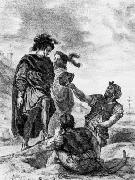La Peinture à l'huile en gros de Chine & Encadre |
|||||||||||

|
|||||||||||
|
|
|
||||||||||||||
|
Eugene Delacroix
French Romantic Painter, 1798-1863 |
||||||||||||||
|
|
||||||||||||||
|
||||||||||||||
|
|
||||||||||||||
| Eugene Delacroix
French Romantic Painter, 1798-1863 Hamlet_and_Horatio_in_the_Graveyard 283 x 214 mm Biblioth?que Nationale, Paris Delacroix discovered Shakespeare in 1825 on a trip to London, where the celebrated Edmund Kean was playing Richard III. In Paris, the equally famous Talma - whose town house was decorated by Delacroix - did much to popularise Shakespeare's work in French. Delacroix saw Hamlet in Paris, in the company of Hugo, de Vigny, Dumas, Nerval and Berlioz. The Shakespearean hero, imperfect, immoderate and immature, was perfectly adapted to Delacroix's temperament, and gave free rein to his imagination; in his hands, the hero could be completed and perfected. It was, of course, Hamlet who most fascinated Delacroix. "Alas, poor Yorick! - I knew him, Horatio: a fellow of most infinite jest..." (Act V, Scene 1). The scene of Hamlet and Horatio in the Graveyard inspired a painting and a series of lithographs which mirror the development of his art as a whole. Author: DELACROIX, Eug?ne Title: Hamlet and Horatio in the Graveyard Form: graphics , 1801-1850 , French , other 283 x 214 mm Biblioth?que Nationale, Paris Delacroix discovered Shakespeare in 1825 on a trip to London, where the celebrated Edmund Kean was playing Richard III. In Paris, the equally famous Talma - whose town house was decorated by Delacroix - did much to popularise Shakespeare's work in French. Delacroix saw Hamlet in Paris, in the company of Hugo, de Vigny, Dumas, Nerval and Berlioz. The Shakespearean hero, imperfect, immoderate and immature, was perfectly adapted to Delacroix's temperament, and gave free rein to his imagination; in his hands, the hero could be completed and perfected. It was, of course, Hamlet who most fascinated Delacroix. "Alas, poor Yorick! - I knew him, Horatio: a fellow of most infinite jest..." (Act V, Scene 1). The scene of Hamlet and Horatio in the Graveyard inspired a painting and a series of lithographs which mirror the development of his art as a whole. Author: DELACROIX, Eug?ne Title: Hamlet and Horatio in the Graveyard Form: graphics , 1801-1850 , French , other |
||||||||||||||
|
Related Paintings to Eugene Delacroix :. |
||||||||||||||
|
|
||||||||||||||
|
|
||||||||||||||
|
CONTACTER DES Etats-Unis |







